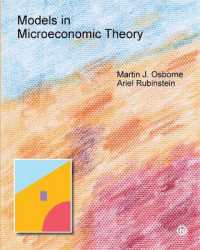- ホーム
- > 洋書
- > ドイツ書
- > School & Learning
- > lessons materials
Description
(Text)
The Book of Pronunciation is a definitive account of the key role pronunciation plays in teaching and learning, providing a highly authoritative but hugely accessible overview of the essential elements of English pronunciation as well as a wide range of classroom practice.
The Book of Pronunciation is accompanied by a CD, which provides models for the teacher and practice for the learners.
This book is the definitive resource for language teachers:looking for ways to incorporate pronunciation into their teachingwishing to expand their range of pronunciation activitieswanting their learners to use language confidently and intelligibly
(Text)
The Book of Pronunciation is a definitive account of the key role pronunciation plays in teaching and learning, providing a highly authoritative but hugely accessible overview of the essential elements of English pronunciation as well as a wide range of classroom practice.
The Book of Pronunciation is accompanied by a CD, which provides models for the teacher and practice for the learners.
This book is the definitive resource for language teachers:looking for ways to incorporate pronunciation into their teachingwishing to expand their range of pronunciation activitieswanting their learners to use language confidently and intelligibly
(Author portrait)
I live in Gdynia, Poland, and work on a freelance basis as a teacher-trainer, writer and translator. I previously lived and worked in Germany, Sweden and the UK.I've written and co-written books and articles in the fields of teacher resources, coursebooks and teacher development, and I've contributed to monolingual and bilingual dictionaries. As well as The Book of Pronunciation, my English Pronunciation in Use - Elementary (CUP) is a product of my particular interest in pronunciation. I'm a founder member and former coordinator of the IATEFL Pronunciation Special Interest Group.I like studying languages and tracing connections between them, and I'm - still - intrigued by the question: Given that so many people in the world learn foreign and second languages informally, without books, teachers and so on, how can formal instruction help them most effectively, as opposed to interfering with the learning process?








